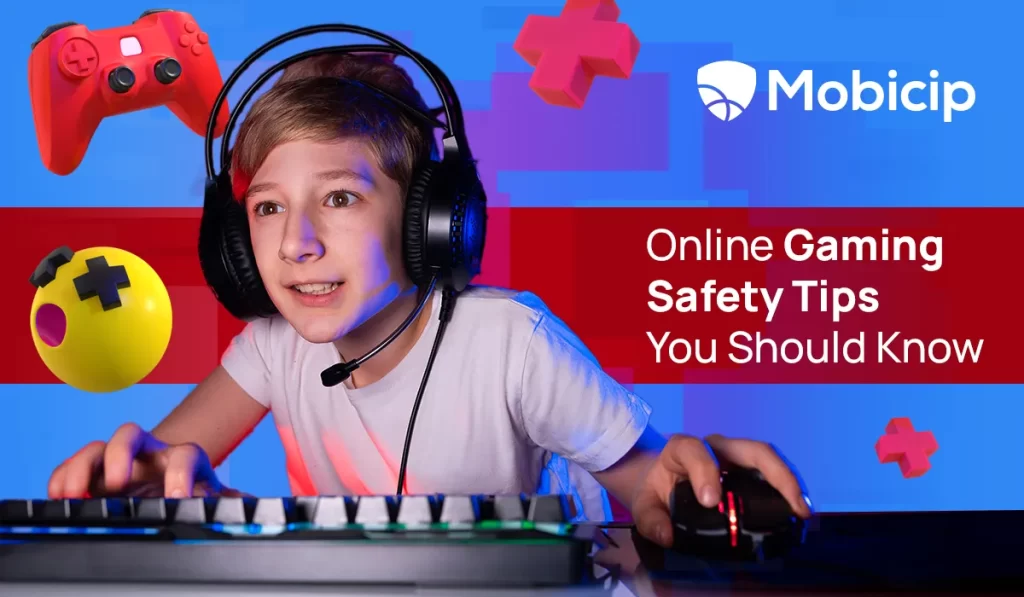Online Gaming Safety Tips You Should Know
Dangers of online gaming have increased as global quarantines led to more screen time for youngsters. This rise in digital play highlights why the dangers of online gaming require closer parental attention today. According to Verizon, online gaming was up 75% in the US during the first week of self-isolation in 2020 and the sales of Nintendo Switch consoles could not meet the demand last year.
As with any topic that’s technology related, online gaming is a cornucopia of benefits and dangers. Which outweighs which is subjective as it depends upon the age and mental state of the gamer and the gaming environment itself.

On the upsides are the social, motivational, emotional, and cognitive benefits of gaming to youngsters, especially in these pandemic times in which they are physically isolated from their peers and friends.
A 2016 study at Columbia University’s Mailman School of Public Health reported that children aged 6-11 benefited from video games through improvements in intellectual functioning and competence in school and had fewer relationship problems with peers.
A survey by the United Kingdom’s National Literacy Trust showed that more than 35 percent of children who play video games believe they are better readers.
The cognitive benefits of video games include better attention, perception, decision-making and memory. Indeed, video games are often used to in training pilots and surgeons who need tremendous amounts of focus and hand-eye coordination to save lives.
But video games are not all beneficial. The problems associated with gaming are not just individualistic but affect the peer gamers as well. Although video gaming is often perceived as an individual activity, the social implications cannot be overlooked. An awareness of the risks associated with kids interacting with strangers can help not just the parent, but the entire community navigate the tricky waters of online gaming.
Dangers of online gaming and the risk of addiction
As early as 1998, research showed that playing video games releases the feel-good brain chemical, dopamine in amounts similar to that seen after intravenous injection of the narcotic methylphenidate (“Meth”). Such levels of dopamine release can rapidly transform online gaming from a recreational activity into an addiction, as it does with drugs.

As with any addiction, video game addiction has a few tell-tale signs:
Disproportionate amount of time spent on the device, gaming
Defending the gaming when confronted about the extended gaming indulgence
Choosing gaming over people
Disconnecting from previously engaged activities and hobbies
Involuntary twitches and movements of hands; this is especially seen in young children who over-use the gaming controller
Setbacks in schoolwork and performance
Spending money on unexplained activities
-
Attempting to hide gaming activities
Addiction develops in stages, with a gradual increase in the amount of time spent on the activity.
A 2016 study analyzed peer influence in video gaming time among adolescents and showed that an additional one hour of playing video games per week by older grade-mates results in 28 minute increase in video gaming time by male adolescents. Another study found that Internet / digital game addicted individuals form close friend groups and interact with other Internet/digital game addicted individuals, thereby reinforcing their own addiction patterns.
It is important for parents to understand how long their children – both young kids and adolescents – play games and what games they are playing. Setting time limits can be a good short-term measure to reset excessive gaming; the word “excessive” can mean different things to the adult and the child; yet, it must be assumed that the adult knows better– after all the prefrontal cortex, the rational part of the brain is underdeveloped until 25 years of age.
Applications such as Mobicip can help monitor and set time limits on children’s devices for various activities, including gaming. Since addiction can be a result of peer pressure and influence, it is important for the care-giving community to work together to help adolescents get over addiction – parent group discussions and recommendations can help in this regard.
Dangers of online gaming and exposure to inappropriate content
While it is indeed true that many games have educational content, some popular games emphasize negative themes such as killing, substance abuse, law breaking, sexual exploitation, stereotypes and inappropriate language. Studies have linked violence in video games to aggression in real life in children. A recent research study reported that parents are often unaware that their children are accessing “tons of apps we classify for adults”.

Inappropriate content in online games may induce the adolescent or child to indulge in risky behaviour. This behavior is often exacerbated by friends and peers. A study funded by the National Institute on Drug Abuse showed that teens may find it more difficult to control impulsive or risky behaviours when their friends are around, or in situations that are emotionally charged.
It is important for parents to be aware of the games that their children indulge in. Every country has its own rating scheme for games and it helps to know the rating on a game before allowing a child to play it. Common Sense Media has game and app reviews with suggested ages. It’s important to remember that the numerical age and the mental age of the child may not match, and the parent knows the maturity level of the child best and must choose or eliminate games accordingly.
Dangers of online gaming and the risk of an unsafe environment
Games have evolved from being single player, single console activities to massively multiplayer online interactions, which often integrates with social media and sharing sites. Many children interact with strangers for the first time in gaming platforms and this comes with the spectrum of online stranger danger, including kill-stealing, cyber bullying, trolling (called “griefing” in the gaming universe) and sexual predation which may, in extreme cases, lead to real life dangers. “Griefers” can deliberately ruin the game for young people by tricking them into giving up their gaming possessions and skins.
Malware
Malware such as Adware and Trojans can infect the devices of children along with dicey video games, and can at best kill the machine or at worst, plant spyware to spy on the child through the camera, keystrokes or voice. It is critical to be mindful of the games that the child downloads. Cyber security software must be used to scan the files that are downloaded to catch malware.
Runaway Cost
Online games may hide tricks to extort money from the user. There is no such thing as free lunch in the gaming arena as well. Many online games work on the “freemium” model, in which a basic content is offered free, but for upgrades, features and ad-free playing, a payment is required. In most cases, credit card information is required to be attached to the profile, even for the free version, which makes accidental purchases easy.
The solution is common-sense. Do not add the credit card number to any freemium games. For subscription-based games, or games that run through services like Apple or Google Play, the purchase password feature must be activated to prevent unintentional purchases. Switching off the “in-app purchases/updates,” can prevent children from accidentally or deliberately racking up huge bills for in-app purchases.

As with any aspect of parenting, open communication is a must. Even better than communication is engaging in the game with the child, which could strengthen the bond through shared experiences and result in the perception of parental validation by children in chosen activities, both of which can tilt the online gaming experience towards the benefits rather than the danger side of the coin.
Lastly, even in this era of nuclear families and individual lives, it does take a village to raise a child, if not literally, at least digitally. No matter how careful parents are in raising the child, the peer group, both online and in-real-life, can significantly influence a child’s behaviour online. Parents of children and teenagers must come together in forums to share knowledge, spread awareness, and look out for each other, so that we may raise a digitally savvy and responsible generation.
Dangers of online gaming and how Mobicip helps you stay in control
Mobicip is one of parents’ most preferred parental control solutions to help manage kids’ online gaming addiction! As a parent, you want to ensure your children have a safe and balanced gaming experience, and Mobicip exactly does that! Here’s how Mobicip can empower you to supervise and regulate kids’ gaming activities:
Mobicip Screen Time:
Mobicip’s screen time scheduler helps prevent gaming addiction by setting limits on gaming hours, encouraging breaks, and promoting a balanced lifestyle. You can set schedules and block specific apps and websites, and manage screen time during a schedule. This reduces excessive gaming, fosters communication, and improves sleep patterns.
Mobicip App Monitor:
Mobicip’s app monitor blocks and limits app usage. Social media and gaming apps distract children from being productive, sometimes leading to screen addiction. You can restrict potentially addictive apps while ensuring access to fun and educational apps. Also, you can set a screen time allowance to limit time spent on various apps.
Mobicip Web Filter:
Mobicip utilizes cutting-edge artificial intelligence (AI) and machine learning (ML) technologies to scan websites in real-time, ensuring their appropriateness for children in specific contexts. By scanning for inappropriate words, phrases, and metadata, Mobicip employs sophisticated algorithms to assess their suitability for children and effectively blocks anything unsuitable.
Frequently Asked Questions:
1. How can I ensure that a gaming app is safe to download?
To ensure a gaming app is safe, use official app stores like Google Play or App Store. Read reviews and check ratings for user feedback. Research the developer’s reputation and website. Verify app permissions and avoid large app sizes. Look for HTTPS connections and install security software. Avoid sideloading from unknown sources. Keep apps updated and be cautious of aggressive in-app purchases. By following these steps, you can download gaming apps more safely and protect your device and personal information. Stay informed and make smart choices for a secure gaming experience.
2. What are some safety tips for children playing games online?
Safety is paramount for children playing games online. Teach them not to share personal information or talk to strangers in games. Supervise their online activities and set time limits. Use parental controls and ensure age-appropriate games. Encourage open communication about their online experiences and any concerns they might have. Warn against clicking on suspicious links or downloading unknown files. Remind them to be respectful and kind to others in the virtual world. Educate them on cyberbullying and what to do if they encounter it. Advise against sharing passwords or logging into accounts on public devices. Create accounts with limited information and review privacy settings. With these precautions, children can enjoy online gaming safely and responsibly.
3. What are some risks associated with online gaming?
Online gaming comes with certain risks. Children can be exposed to inappropriate content and interactions with strangers. Cyberbullying and harassment are prevalent issues in online communities. Some games may promote violence or addictive behaviors. Hackers and scammers can target gamers to steal personal information or financial data. Excessive gaming can lead to health problems like eye strain and sedentary lifestyle. Online transactions for in-game purchases pose financial risks. Phishing attempts and malware through game-related links are also concerns. Also, addiction and social isolation can be consequences of excessive gaming. Being aware of these risks allows gamers and parents to take necessary precautions and enjoy online gaming responsibly.
4. How can I protect my child while they’re gaming?
To keep your child safe while gaming, set clear rules and boundaries for online activities. Use parental control solutions and privacy settings on gaming devices and platforms. Educate them on the dangers of sharing personal information and interacting with strangers. Keep a track on the games they play and their gaming sessions. Play online games together. Encourage open communication about any concerns they may have. Set time limits to avoid excessive screen time. Teach them how to recognize and report cyberbullying and inappropriate content. Install dependable antivirus and anti-malware software. By implementing these measures, you can create a safer gaming environment and protect your child’s online safety.
5. What are some ways to keep gaming fun?
To keep gaming fun for your child, set reasonable time limits for gaming sessions. Encourage a healthy balance between gaming and other activities. Play games together to bond and understand their interests. Choose age-appropriate games that align with their preferences. Be supportive and avoid excessive criticism of their gaming skills. Create a positive and non-competitive environment. Celebrate their achievements and progress in games. Allow breaks to prevent burnout and eye strain. Engage in offline activities and outdoor play to diversify their experiences. By following these steps, you can foster a fun and enriching gaming experience for your child.




